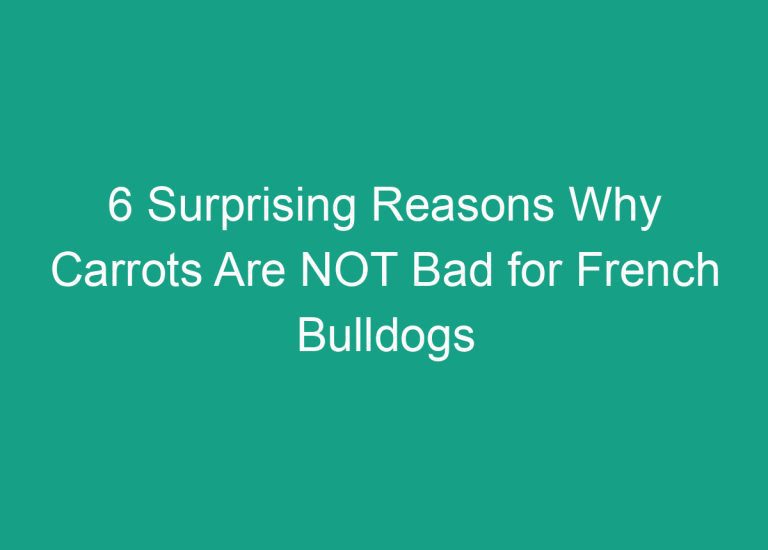What To Feed A French Bulldog With A Sensitive Stomach [Explained]
Do you have a French Bulldog with a sensitive stomach You’re not alone. French Bulldogs are prone to digestive issues, and finding the right food can be a challenge. But don’t worry, I’m here to help. In this guide, I’ll share everything you need to know about feeding a French Bulldog with a sensitive stomach, including the best foods to choose, how much to feed, and how to manage common symptoms.
So, What To Feed A French Bulldog With A Sensitive Stomach?
What to feed a French Bulldog with a sensitive stomach
French Bulldogs are prone to having sensitive stomachs. This can be due to a number of factors, including genetics, diet, and environmental triggers.
If your French Bulldog has a sensitive stomach, there are a few things you can do to help manage their symptoms.
First, try to identify the triggers that are causing your dog’s stomach upset. This may involve keeping a food diary or eliminating certain foods from their diet.
Second, choose a diet that is specifically designed for dogs with sensitive stomachs. These diets are typically made with easily digestible ingredients and are low in fat and fiber.
Finally, make sure to feed your dog small, frequent meals throughout the day. This will help to prevent their stomach from becoming too full and upset.
If your French Bulldog’s stomach problems are severe, you should talk to your veterinarian about other treatment options.
What to Feed a French Bulldog with a Sensitive Stomach
Symptoms of a Sensitive Stomach
There are a number of signs that can indicate that your French Bulldog has a sensitive stomach. These include:
Vomiting
Diarrhea
Gas
Bloating
Constipation
Inappetence
Weight loss
If you notice any of these symptoms in your dog, it is important to take them to the vet to rule out any other medical conditions.
Causes of a Sensitive Stomach
There are a number of different things that can cause a French Bulldog to have a sensitive stomach. These include:
Food allergies or intolerances
Indigestion
Stress
Infection
Parasites
Medications
Treatment for a Sensitive Stomach
The treatment for a sensitive stomach will depend on the underlying cause. If your dog has a food allergy or intolerance, you will need to remove the offending food from their diet. Indigestion can be treated with medication, and stress can be managed with behavioral modification. Infections and parasites can be treated with antibiotics or anti-parasitic medications.
Preventing a Sensitive Stomach
There are a number of things you can do to help prevent your French Bulldog from developing a sensitive stomach. These include:
Feeding a high-quality diet that is specifically designed for French Bulldogs
Avoiding foods that are known to be allergens or irritants
Allowing your dog to eat their food slowly
Avoiding overfeeding your dog
Keeping your dog’s food and water bowls clean
Managing stress in your dog’s life
By following these tips, you can help keep your French Bulldog happy and healthy.
You Must Read THIS: How To Get Rid Of Frenchie Tear Stains
FAQs: What to Feed a French Bulldog with a Sensitive Stomach
What foods are safe for French Bulldogs with sensitive stomachs?
Plain, cooked chicken or turkey
White rice
Oatmeal
Plain yogurt
Puréed fruits and vegetables
What foods should I avoid feeding my French Bulldog with a sensitive stomach?
Greasy or fatty foods
Spicy foods
Dairy products
Raw or processed meats
Artificial sweeteners
How much should I feed my French Bulldog with a sensitive stomach?
Start with small, frequent meals throughout the day. Gradually increase the amount of food you feed your dog as their stomach adjusts.
How can I help my French Bulldog manage their sensitive stomach?
Avoid stress
Keep a regular feeding schedule
Make sure your dog has access to fresh water at all times
Use probiotics and digestive enzymes
See your veterinarian if your dog’s symptoms persist
What are the signs of a food allergy in French Bulldogs?
Diarrhea
Vomiting
Skin irritation
Ear infections
Weight loss
If you think your French Bulldog may have a food allergy, see your veterinarian for a diagnosis.




![What Are French Bulldogs Bred For [Answered]](https://onlyfrenchbulldog.com/wp-content/uploads/2024/06/what-are-french-bulldogs-bred-for-answered_3194-768x550.jpg)

